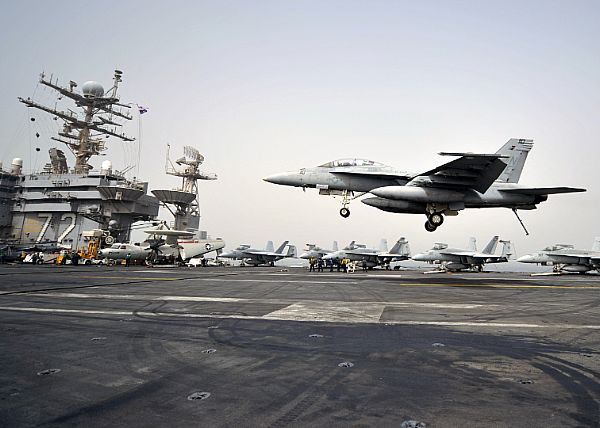Iranian Atomic Urgency

• A war simulation run by the Pentagon predicts an Israeli strike on Iran will lead to wider war. The results were leaked to the NY Times:
But the game has raised fears among top American planners that it may be impossible to preclude American involvement in any escalating confrontation with Iran, the officials said . . .
Officials said that, under the chain of events in the war game, Iran believed that Israel and the United States were partners in any strike against Iranian nuclear sites and therefore considered American military forces in the Persian Gulf as complicit in the attack. Iranian jets chased Israeli warplanes after the attack, and Iranians launched missiles at an American warship in the Persian Gulf, viewed as an act of war that allowed an American retaliation.
Responding to the leak, Brett Stephens (WSJ, click via Google News) raises the obvious point:
On Monday, the Times published the (leaked) results of a “classified war game” in which an Israeli strike on Iran leaves “hundreds of American dead,” perhaps through an attack on a Navy warship. That isn’t exactly the subtlest way of warning Israel that, should they strike Iran, they will do so forewarned that American blood will be on their hands, never mind that it’s the Iranians who would be doing the killing.
Is this outcome likely? Maybe, though it assumes a level of Iranian irrationality—responding to an Israeli attack by bringing the U.S. into the conflict—that top U.S. officials don’t otherwise attribute to Iran’s leaders. But the deeper problem with this leak is that an intelligence product is being used as a political tool.
• Richard Cohen: A successful Israeli strike doesn’t have to deliver a smashing knockout blow. Buying time really could be sufficient:
Israel notes that its 1981 bombing of a nuclear reactor in Iraq set back Saddam Hussein’s program — and did not result in some sort of massive retaliation. Something similar happened with the 2007 bombing of a Syrian installation. Neither operation was conceived as a long-term solution, but both accomplished short-term goals. In a year or two, much could change in the Middle East.
Arab Spring Winter
• Moscow denies an explosive ABC News report that Russian anti-terror troops have arrived in Syria. Other than Iranian and Hezbollah assistance, Assad’s not really interested in internationalizing the conflict. Given the paucity of info, Tariq Almohayed can only raise questions. Here’s one:
Do the Russians really intend to intervene to evacuate their nationals in the event of the regime suddenly collapsing, or is the story related to the American and Israeli concern about how to protect against the missiles and weapons that threaten Israel’s security if the al-Assad regime falls.

• Human Rights Watch accuses the Syrian opposition of abuses. AP picks up on the story.
• The Guardian: As a result of her online shopping habits, Asma Assad and other family members are now on the EU’s list of sanctioned Syrians. The blacklist is small price to pay. After all, as Fernando Lamas put it, “It is better to look good than to feel good.”
• More Syrian docs leaked — this time, to Al-Jazeera. Who hasn’t obtained secret files from Assad’s regime?
Rest O’ the Roundup
• How comfortable is the NY Times with its paywall? Enough to cut in half the number of free articles. Starting in April, non-paying readers get access to only 10 free articles.
(Image of jet via US Navy/Brian Morales, Pentagon via Flickr/mindfrieze, Russian armed forces banner via Wikimedia Commons/Flanker )
For more, see yesterday’s Israel Daily News Stream.
Clicking “Unsubscribe instantly” on your mailing will remove you from the Israel Daily News Stream list, but not from your regular HonestReporting emails.

